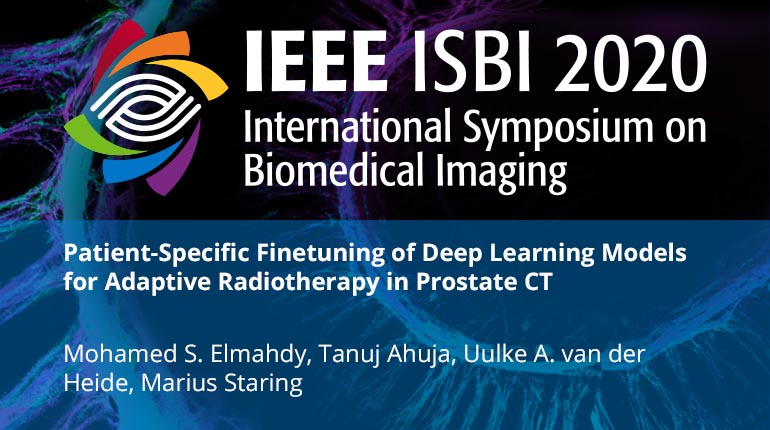
Already purchased this program?
Login to View
This video program is a part of the Premium package:
Patient-Specific Finetuning of Deep Learning Models for Adaptive Radiotherapy in Prostate CT
- IEEE MemberUS $11.00
- Society MemberUS $0.00
- IEEE Student MemberUS $11.00
- Non-IEEE MemberUS $15.00
Patient-Specific Finetuning of Deep Learning Models for Adaptive Radiotherapy in Prostate CT
Contouring of the target volume and Organs-At-Risk (OARs)is a crucial step in radiotherapy treatment planning. In an adaptive radiotherapy setting, updated contours need to be generated based on daily imaging. In this work, we lever-age personalized anatomical knowledge accumulated over the treatment sessions, to improve the segmentation accuracy of a pre-trained Convolution Neural Network (CNN), for a spe-cific patient. We investigate a transfer learning approach, fine-tuning the baseline CNN model to a specific patient, based on imaging acquired in earlier treatment fractions. The baseline CNN model is trained on a prostate CT dataset from one hospital of 379 patients. This model is then fine-tuned and tested on an independent dataset of another hospital of 18 patients,each having 7 to 10 daily CT scans. For the prostate, seminal vesicles, bladder and rectum, the model fine-tuned on each specific patient achieved a Mean Surface Distance (MSD) of 1.64?0.43 mm, 2.38?2.76 mm, 2.30?0.96 mm, and 1.24?0.89 mm, respectively, which was significantly better than the baseline model. The proposed personalized model adaptation is therefore very promising for clinical implementation in the context of adaptive radiotherapy of prostate cancer.
Contouring of the target volume and Organs-At-Risk (OARs)is a crucial step in radiotherapy treatment planning. In an adaptive radiotherapy setting, updated contours need to be generated based on daily imaging. In this work, we lever-age personalized anatomical knowledge accumulated over the treatment sessions, to improve the segmentation accuracy of a pre-trained Convolution Neural Network (CNN), for a spe-cific patient. We investigate a transfer learning approach, fine-tuning the baseline CNN model to a specific patient, based on imaging acquired in earlier treatment fractions. The baseline CNN model is trained on a prostate CT dataset from one hospital of 379 patients. This model is then fine-tuned and tested on an independent dataset of another hospital of 18 patients,each having 7 to 10 daily CT scans. For the prostate, seminal vesicles, bladder and rectum, the model fine-tuned on each specific patient achieved a Mean Surface Distance (MSD) of 1.64?0.43 mm, 2.38?2.76 mm, 2.30?0.96 mm, and 1.24?0.89 mm, respectively, which was significantly better than the baseline model. The proposed personalized model adaptation is therefore very promising for clinical implementation in the context of adaptive radiotherapy of prostate cancer.
 Cart
Cart Create Account
Create Account Sign In
Sign In





